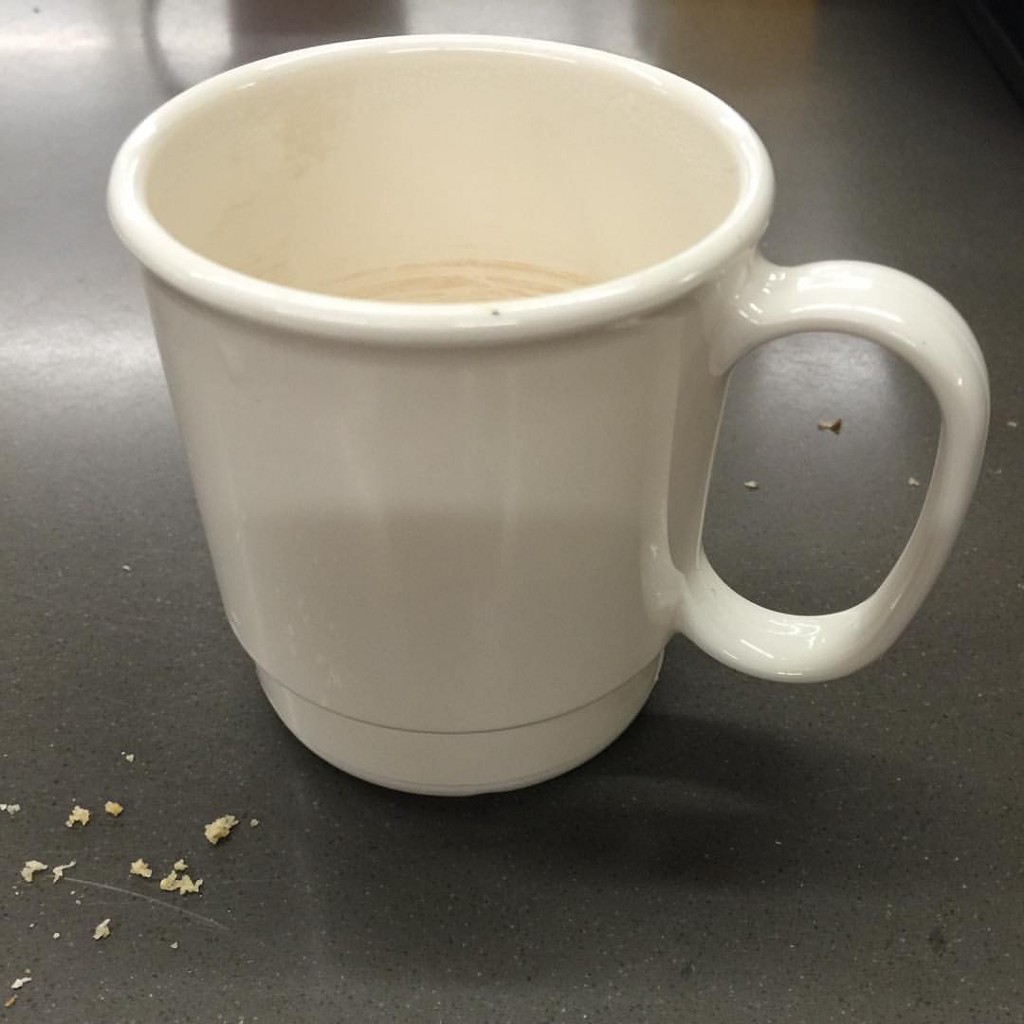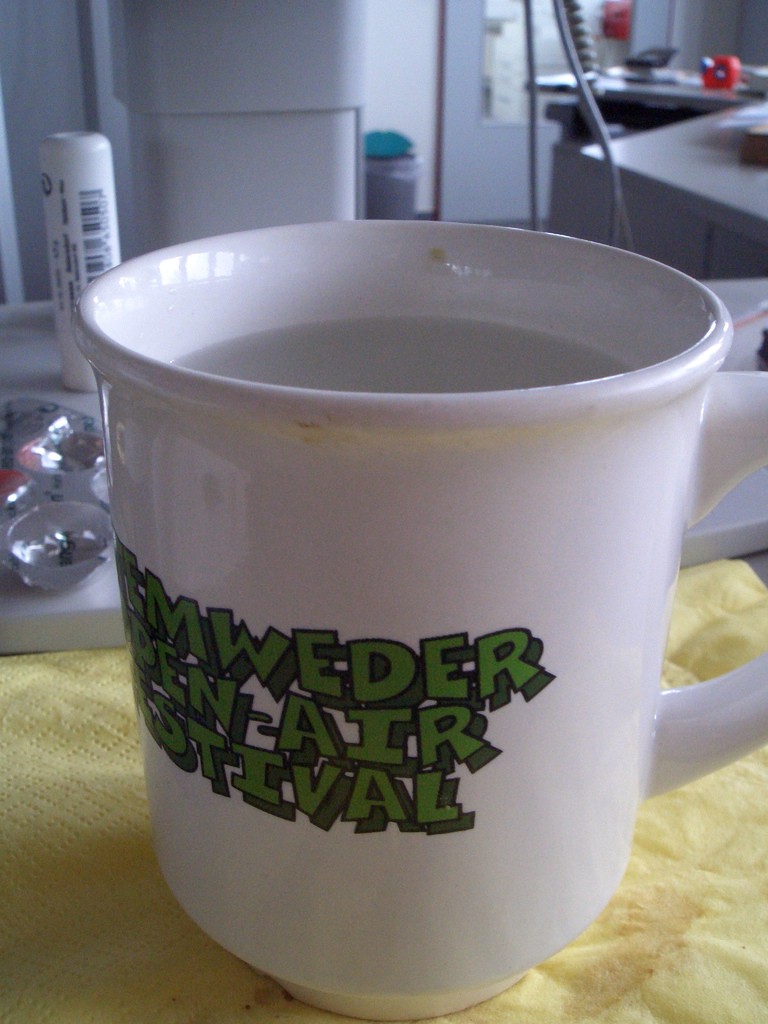Drinking Cold Water From A Mug Is Wrong And Disgusting
Why would you do it?

It’s a warm spring day and I’m sitting here doing something strange. It’s a situation you’ve likely faced once or twice in your life as well, and — if you’re anything like me — you felt equally weirded out by it. Against my better judgment, I’m drinking cool tap water out of a thick ceramic mug. And it’s just flat-out wrong.
I don’t think there’s a single sane person out there that will disagree with me on this point. Drinking water out of a mug feels kind of like trying to eat soup off a plate or cutting steak with a spoon; it just doesn’t make sense. But of course it’s not like these things. When you really think about it, drinking water from a mug is perfectly logical. Just like a glass, a mug is a receptacle meant to hold liquid, and it gets the job done. So why am I so averse to this relatively harmless action?
Several forums across the web attempt to answer this riveting question, including a subreddit titled “Drinking water from a coffee mug is incredibly dissatisfying.” A few commenters focus on the obvious — mugs are meant for hot beverages. While that explains why a hot drink can’t be in a glass, it doesn’t really explain why a cold drink can’t be in a mug. Some dive into the idea of “adulting,” as if the act of drinking water from a glass is a sign that you’ve finally grown up. Indeed, water in a mug does bring up memories of dirty dorm rooms, but I don’t think that’s the real issue. Others touched on the idea that mugs have trace flavors of the coffee and tea that came before, an argument that has its merits. But again, not the whole story. The majority of commenters just hold strong to the orthodoxy: Nope, no, uh-uh — cold water does not belong in a mug, period.

If you think about it, humans in general are pretty finicky about what drinks go in which vessels. Wine in a stemmed glass, whiskey in a tumbler, champagne in a flute. Espresso must have a saucer, a gibraltar must be in a gibraltar, etc. The difference here, though, is that coffee and alcohol are hobby beverages. We have enthusiasts for these things, and with enthusiasm comes refinement, and with refinement comes protocol. Water has not quite reached this cult status. But as it turns out, our need for water in a glass may have something to do with the refinement of these hobbyist drinks.
Glass was not always as we know it now. At the time of its inception about 5,000 years ago, glass was opaque and uncommon. It was used primarily to make ornaments for royalty before being used to create drinking vessels some thousand years later. Some thousand years after that, transparent glass came along and knocked people on their ancient butts with a newfound pleasure: seeing the contents of cup through the cup while drinking it! This became especially popular for wine, and likely contributed to the refinement of vino — you could now easily see the color, the legs, etc, and judge the wine accordingly. Transparent glass replaced opaque materials as the substance of choice for drinking vessels, and as glassblowing became widespread, glasses were brought down from the exclusive domain of the powerful to the lives of ordinary people like you and me. From there, they just became the norm, evolving into our draconian present where glasses rule.
In the meantime, new shapes emerged for specific drinks. The stem was created so our body heat wouldn’t warm the wine, the flute was designed to retain the carbonation of champagne and the snifter was designed to enhance the aroma of brown spirits. Setting aside those raised pinkies, there were legit reasons for these glass assignments. But water in a glass? Not so much. And yet we are often more willing to break those rules than the water-in-a-glass rule. Why?
Here’s a theory: It was all about the transparency. Imagine a time when clean, clear drinking water was scarce. Wouldn’t you want to see what was — or prove what wasn’t — floating in your water? Even now, I think this holds true. Our idea of water is one of a pure, translucent, pristine thing. Drinking it out of a glistening clear glass reassures us that the water we consume is uncontaminated, and even enhances the illusion of crystal clarity. But, OK. If you’re reading this, you most likely live in a time and place where clean drinking water is kind of a given. With some exceptions, it just flows from a faucet on demand like magic. No matter the vessel, you can assume it’s safe to drink. But this assumption doesn’t do away with thousands of years of history that led us to this point. Every currently living person of this culture was born into it surrounded by glasses. We’ve never known anything else, so we’ve evolved with this habit.
That means it’s possible that it’s purely Pavlovian. We see wine, we think wine glass; we see coffee, we think mug; we see water, we think glass. It’s society’s bell ringing in our heads to remind us of the social order. Like most of the rules imposed upon us, it’s a learned behavior, taught to us by our respective cultures for better or worse. And like most of these learned behaviors, we’ve accepted it as truth. Houses must have lawns, lawns must be mowed, jobs are essential, skirts are for girls, water can’t be in a mug and that’s that, right? Them’s the rules.
With this in mind, it’s possible that the basis of our entire modern reality hinges upon maintaining the separation of cold water and mugs, just like someone else’s reality may hinge upon the separation of boys and skirts. We are our social constructs. It’s not logical; it’s emotional. But here’s the thing: We are in the age of dissent. We’re breaking nonsensical rules and restructuring the social anatomy so boys can wear skirts and lawns get the middle finger. Is it time to do away with our hard-and-fast no-water-in-mugs rule?
I’m going to argue no. I’m all for breaking societal norms in the name of social progress, to improve the lives of the marginalized and unshackle us from restrictive conventions. Water in a mug just might not rise to that level of import. We’re not going to break down society’s barriers by doing it; we’re just going to weird ourselves out. So, logical or not, pour me a glass of water and let’s talk dissent.
